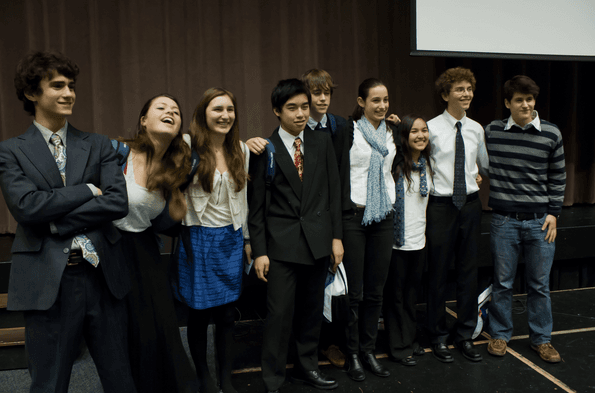U.S. students compete to improve environment — and win trip to Costa Rica
Glocal Challenge winners, from left, Josh Brancazio, Isabel Gray, Aida Muratoglu, Eric Chan, Ben Austin, Clio Macrakis, Anisha Nakagawa, Zachary Spitz and Octavio Chiesa celebrate after winning free trips to Costa Rica for the EF Global Student Leaders Su
More than 500 high school students from across North America have taken up the challenge to find practical solutions to ecological problems in their communities.
Participants in the Glocal Competition get to go to the Global Student Leaders Summit in Costa Rica and get to meet Al Gore.
At Cambridge Rindge and Latin School in Massachusetts, the students have been told to identify an environmental problem in their community and find realistic, actionable solutions. The students had one month to research a problem, find solutions and present the idea to their teachers, peers and a panel of judges.
At a school assembly, complete with performances by the school step team and jokes from students, teams unveiled their presentations to students and one final judging. The winners received the trip to Costa Rica.
The students took on a range of environmental issues from wasting electricity to recycling school milk containers. Chris Desnoyers is a member of a team called the Invasive Rangers, which examined the problem of invasive species like purple loosetrife and water chestnuts.
“The Department of Conservation and Recreation has a $10 million dollar budget for combating these invasive species; however this isn’t enough to eradicate them,” he said. “They’ve been combating pepperweed, a salt marsh invasive. This has taken 2,000 volunteer hours in the last year just to get it somewhat under control.”
Their solution is to create an education campaign to allow citizen scientists to take photos of invasive species and tag them using existing map technology. That leaves more time for government scientists to do more complex work.
Another student group calls themselves the EPA, Environmental Paper Assault. They’re concerned with how much paper their school uses in a year. The school’s annual paper use would stack to 1,867 feet, several hundred feet taller than the Empire State building, one student tells the gathered crowd.
Instead of paper, they suggest investing in inexpensive laptops so students would no longer need paper hand-outs from teachers.
Altogether, 500 students from across the United States and Canada submitted projects to the competition. At West Potomac High School in Alexandria, Va.,. one group of students was worried about pollution running into the Potomac River.
Senior Max Leonard participates in the crew team there and says he can see how oily and polluted the water gets.
“It’s not always safe to swim in all the time, especially if you have cuts because they can be very easily infected,” he said. “I think it would be nice for us to make the river cleaner.
Much of the pollution is caused by run-off from parks and golf courses, so the students plan to build buffers to keep it out of the river, said Lee Orleans, another team member.
“We want to build up a bidi buffer is what we’re calling it, which is our take on a riparian buffer,” he said. “And we’re going to make them smaller so they fit in our area and we can make more of them and they’re more cost effective than a large buffer.”
The “Glocal Challenge” was created by the for-profit organization EF Education First. Their mission is to facilitate student learning through travel abroad. Kate Burseth, the executive vice-president of EF Education First, says she’s surprised by the response she has seen from the students participating in the challenge.
“I thought the draw would be a trip to Costa Rica and I think the draw is very much a chance to have their voices heard and a chance to come up with creative solutions to challenges that they see,” she said.
That’s certainly what Cambridge student Andreas Hoffman feels.
“The environment is the place where we’re going to grow up and live out the rest of our lives,” Hoffman said. “So, it’s important not only for the present, like the baby boom generation, but it’s really important for us because we’re the ones that are going to be inheriting this planet.”
Ultimately, Environmental Paper Assault and another group, Environmental Action Club, were announced as winners.
The second winning group, an existing environmental club at the school, wants to work with the city of Cambridge to invest in green roofs and walls to reduce the urban heat island effect, said Aida Muratoglu, a freshman on the team.
“I’ve actually been into these environmental issues my whole life really, so, it’s just a next step,” she said. “It’s everything we know, it’s everything we are. The fact that it’s dying, that it’s going away on us is really important to me.”
The students trip to Costa Rica is set to coincide with Earth Day, later this month.
Every day, reporters and producers at The World are hard at work bringing you human-centered news from across the globe. But we can’t do it without you. We need your support to ensure we can continue this work for another year.
Make a gift today, and you’ll help us unlock a matching gift of $67,000!
